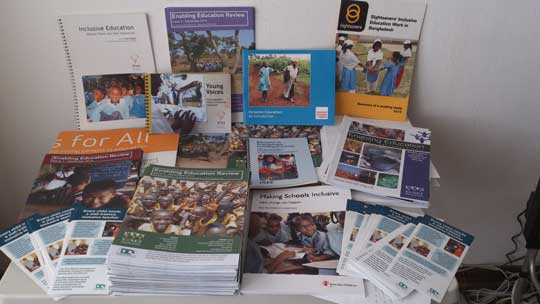Using materials from EENET to support teachers in Namibia
Diane Mills and Rosina Tjizu
I worked for five years as Inclusive Education Adviser in the Kunene region in Namibia (2003-2008). From the start I relied on EENET to send me resources. Inclusive education was a fairly new concept and teaching and learning materials were generally limited. Working in such a remote area with many challenges, I found that just receiving the annual Enabling Education Review was a bonus. It gave me a link to educators working in other developing countries whom I discovered were facing similar challenges.
I decided to continue living in the area when my post finished, and have maintained strong links with ex-colleagues from the Ministry of Education. These days I work as an EENET consultant. Whenever I’m running a training workshop I display details of EENET’s website and have a table of EENET resources that participants can borrow and read or request from EENET. In Kunene and most other areas and countries where I work, teachers and other education personnel don’t have access to the internet. Hard copies are much more effective, which is why it’s such a benefit that EENET still distributes printed materials.
We recently received a box of resources from EENET, containing posters, leaflets, editions of the Enabling Education Review and various other useful books. Rosina Tjizu (Education Officer) and I reflected on how EENET’s inclusive education training and advocacy materials have helped us over the years.
Diane Mills

| We have an inclusive education section in our teachers resource centre library. Materials from EENET are always available for teachers to read or borrow. Alongside this, Diane and I made a wall display about inclusion using old pieces of card and paper and photos taken in our mobile schools.
A few weeks ago I attended a workshop in Windhoek about how to include children who are deaf. Together with the Regional School Counsellor I’m now expected to cascade the training to life-skills teachers. I will use EENET’s materials to help me plan the training sessions. I will also display the books and posters for teachers to read. Sometimes I make photocopies of diagrams and pictures from the EENET materials – these really help me to explain the meaning of inclusive education. At Education Management team meetings I make others aware of the materials and give them information about inclusion. The other education officers can then talk about inclusive education when they visit schools. It is very useful for us all to read EENET’s Enabling Education Review. We see what’s happening in other countries. Teachers like to see how their peers in other countries try to find solutions to their problems. In Kunene we no longer have an Inclusive Education Adviser so teachers often come to my office for advice and help. The materials from EENET mean that I have more knowledge about inclusive education and so can give the teachers the correct support. Thank you EENET from the Education Team in Kunene. |
Diane Mills works as a consultant with EENET. Rosina Tjizu is Education Officer in Kunene Region, Namibia.
Contact Diane at: dianemills@eenet.org.uk
